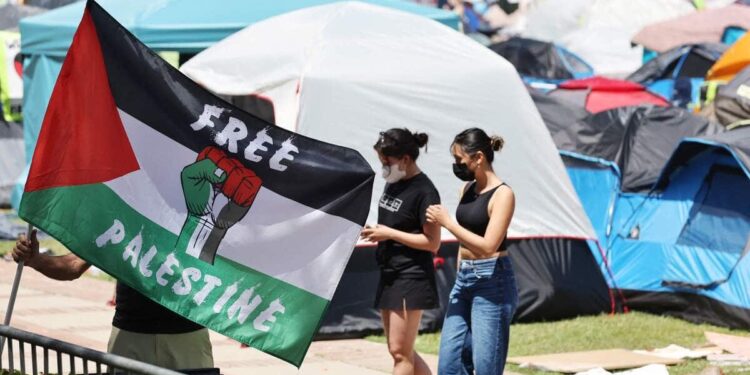For two weeks, mobilizations in support of Gaza have multiplied in American universities. For Julie Reuben, a historian and professor at Harvard who has worked on student activism, there are similarities with previous protest movements in the country.
• Read also: (IN PICTURES) Pro-Palestinian encampments: police dismantle barricades at UCLA
• Read also: New York police clear out pro-Palestinian protesters from Columbia University
The “deep divisions” and charged with “emotion” on Gaza, as well as the use by certain universities of the police on their campus, recall, according to her, certain aspects of the student demonstrations against the Vietnam War in the 1960s and 70s.
Students are also calling today for their universities to cut ties with companies or patrons linked to Israel, a demand for divestment similar to that made in the 1980s regarding the apartheid regime in South Africa.
What were the main student protest movements in the United States?
“The greatest period of student protests in the United States, and many other countries, was the 1960s. The first big one began in 1964, and from 1968 to 1972, the protests were very numerous. (…) They concerned civil rights, student rights, freedoms, women, and a big subject was the Vietnam War.
No other period has there been six years of intense protests on a variety of issues on so many campuses across the United States. This is a unique time.
But since then demonstrations have been frequent. Sometimes they are small and focus on local issues, sometimes they become a national movement (…). Like the protests for divestment from South Africa.”
Are the current protests comparable?
“The call to divest from South Africa was met with strong resistance, it took years of activism for many campuses to divest. People didn’t necessarily think it was a good thing for universities. But there were no very marked divisions on this subject. It was not an emotionally charged subject, about which people had deep disagreements.
I think the protests of the 1960s were more like this. The Vietnam War was a very controversial subject. Many people thought it was an immoral war (…). But many students, at the start of the protest, also thought it was un-American to protest the war.
(Today, on the situation in Gaza, Editor’s note), it is also a subject which arouses strong emotional divisions. And that’s something we haven’t really seen since the Vietnam War.
I also think that the off-campus interest in the protests, as well as the condemnation of students, is something that was very strong during the protests against the Vietnam War, where there was a lot of criticism of the outside, a lot of political pressure to silence them. And that’s also what we’re seeing today.”
And in terms of the number of demonstrators?
“It’s not the scale that we saw at the height of the 1960s in terms of the number of protesters, but the speed with which the movement has spread across many campuses is, I think, very striking.”
What was the response from universities, yesterday and today?
“In the 1960s, university leaders were outraged that students would dare to organize such protests. The repression was very strong. (…) But a trend also appeared at the end of the decade: the stronger the repression of demonstrations – police intervention, arrests of students – the more they grew. Institutions began to realize that it was perhaps better to tolerate the demonstrations, (…) that this would make them disappear more quickly.
So starting in the 1970s – and I think it continued until fairly recently – universities often responded to protests with disciplinary measures, but not really severe ones.
So it’s striking that so many universities are calling in the police today, because that was a very common response in the 1960s, and I think a lot of people admit that it wasn’t a winning response. .”



